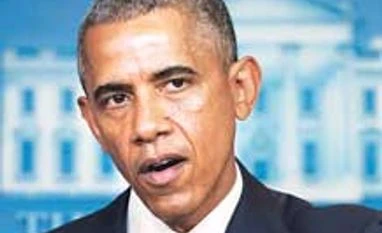US President Obama is considering airstrikes or airdrops of food and medicine to address a humanitarian crisis among as many as 40,000 religious minorities in Iraq who have been dying of heat and thirst on a mountaintop after death threats from the Islamic State in Iraq and Syria, administration officials said on Thursday.
The president, in meetings with his national security team at the White House on Thursday morning, has been weighing a series of options ranging from dropping humanitarian supplies on Mount Sinjar to military strikes on the fighters from ISIS now at the base of the mountain, a senior administration official said.
"There could be a humanitarian catastrophe there," a second administration official said, adding that a decision from Obama was expected "imminently - this could be a fast-moving train."
The administration had been delaying taking any military action against ISIS until there is a new Iraqi government. Both White House and Pentagon officials have said privately that the United States would not intervene militarily until Prime Minister Nuri Kamal al-Maliki stepped down.
But administration officials said on Thursday that the crisis on Mount Sinjar may be forcing their hand. About 40 children have already died from the heat and dehydration, according to Unicef, while as many as 40,000 people have been sheltering in the bare mountains without food, water or access to supplies.
The administration officials spoke on the condition of anonymity because they were not authorised to speak publicly. One official said that any military action would be "limited, specific and achievable," noting that Maliki's political party was supposed to announce a new candidate for prime minister on Thursday, but had not yet.
©2014 The New York Times News Service
The president, in meetings with his national security team at the White House on Thursday morning, has been weighing a series of options ranging from dropping humanitarian supplies on Mount Sinjar to military strikes on the fighters from ISIS now at the base of the mountain, a senior administration official said.
"There could be a humanitarian catastrophe there," a second administration official said, adding that a decision from Obama was expected "imminently - this could be a fast-moving train."
More From This Section
The administration official said that "the president is weighing both passive and active options," defining passive action as dropping humanitarian supplies. He added, using an alternative name for ISIS, "More active, we could target the ISIL elements that are besieging the base of the mountain."
The administration had been delaying taking any military action against ISIS until there is a new Iraqi government. Both White House and Pentagon officials have said privately that the United States would not intervene militarily until Prime Minister Nuri Kamal al-Maliki stepped down.
But administration officials said on Thursday that the crisis on Mount Sinjar may be forcing their hand. About 40 children have already died from the heat and dehydration, according to Unicef, while as many as 40,000 people have been sheltering in the bare mountains without food, water or access to supplies.
The administration officials spoke on the condition of anonymity because they were not authorised to speak publicly. One official said that any military action would be "limited, specific and achievable," noting that Maliki's political party was supposed to announce a new candidate for prime minister on Thursday, but had not yet.
©2014 The New York Times News Service
)